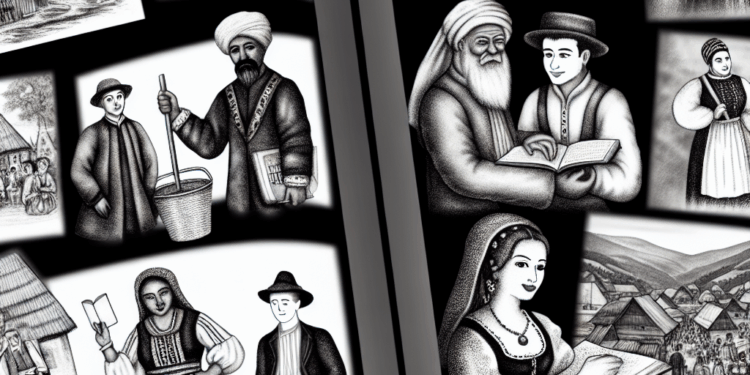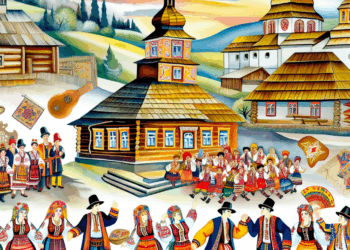Outstanding personality of Bukovyna: Mykhailo Petrovych Dry-Khmara
Introduction
Bukovyna, a historical region at the crossroads of cultures and peoples, has attracted the attention of many outstanding personalities. One of them is Mykhailo Petrovych Dry-Khmara – a Ukrainian poet, cultural figure and public figure who played a significant role in the formation of Ukrainian national consciousness in the early 20th century. His life and activities epitomised the spirit of his time and made a significant contribution to Ukrainian culture and literature, especially in the context of a complex historical era when Bukovyna was part of the Austro-Hungarian Empire and underwent many changes.
Biography
Mykhailo Dry-Khmara was born on 8 October 1895 in the city of Chernivtsi. He belonged to an educated family, which was the basis for his future pursuit of knowledge and cultural activities. Dry-Khmara actively participated in the cultural life of his region, particularly in literary and public initiatives aimed at popularising the Ukrainian language and culture.
He first studied at a gymnasium in Chernivtsi and then continued his education at the university. He studied philology and was active in poetry, which soon brought him fame. After receiving his education, Dry-Khmara began his career as a teacher, passing on knowledge and love of literature to new generations. During this time, he also actively participated in cultural and social events, supporting and developing the Ukrainian idea.
Literary heritage
One of the main achievements of Mykhailo Dray-Khmara was his literary work. His poems, written in Ukrainian, reflected the deepest feelings and experiences of his people. He became one of the brightest representatives of Ukrainian poetry, his work was characterised by sincerity, deep emotionality and richness of language.
The main themes of his work included love for his native land, national identity, suffering of the people and hope for a better future. His poems are saturated with folklore motifs, which allows for a deeper understanding of Ukrainian culture and traditions. Dray-Khmara became not only an author of poetry, but also a literary theorist, developing his views on poetry and its social role.
Social activity
In addition to literarnyh achievements, Dry-Khmara was actively engaged in social activities. He was a member of various cultural and educational organisations that sought to develop Ukrainian culture and support it under conditions of occupation and political oppression. His passion for education led to the creation of cultural events, exhibitions and lectures that aimed to introduce Ukrainian cultural achievements to a wide audience.
At this time, significant political and social changes were taking place in Bukovina. Dry-Khmara actively opposed oppression and supported the ideas of Ukrainian autonomy and independence. His activism and influence on young people helped awaken interest in national issues and stimulated the growth of national consciousness.
The context of the era
The era in which Dray-Khmara lived and worked was filled with political and social unrest. After World War I, Bukovina was ceded to Romania, which caused discontent among the Ukrainian population. At this time, national feelings were sharpening, and Drai-Khmara became one of those who raised their voices in defence of the rights of the Ukrainian people.
In a difficult political environment and the struggle for national identity, culture became an important tool in the struggle for rights. Dry-Khmara realised that through poetry and public activities it was possible not only to preserve culture, but also to inspire the people to fight for their rights.
Impact on the region
Mykhailo Dry-Khmara’s influence on Bukovyna and Ukraine as a whole cannot be overestimated. He became a symbol of cultural resilience and hope for many people. His work inspired young poets and writers, emphasising the importance of preserving national culture in times of crisis. His poems have become part of the literary heritage, inspiring generations.
In addition, Drai-Hmara actively interacted with other cultural and social figures of his time. He liaised with writers, artists and scholars, which facilitated an active exchange of ideas and values. This co-operation led to the creation of a number of cultural initiatives that transcended Bukovyna and the Ukrainian context.
Conclusion
The life and work of Mykhailo Dry-Khmara is an important page in the history of Bukovyna and the whole Ukraine. His contribution to culture and public life continues to influence contemporary Ukrainian society. In the face of difficult historical changes, he became a symbol of hope and strength, showing how art and education can unite people, inspiring them to fight for their identity and rights.
The memory of Mykhailo Dray-Khmara lives not only in his works, but also in the hearts of those who strive to preserve and develop the rich cultural heritage of the Ukrainian people. His life and work are an example of how each generation can contribute to the common cause, continuing traditions and creating new pages in the history of their country.








